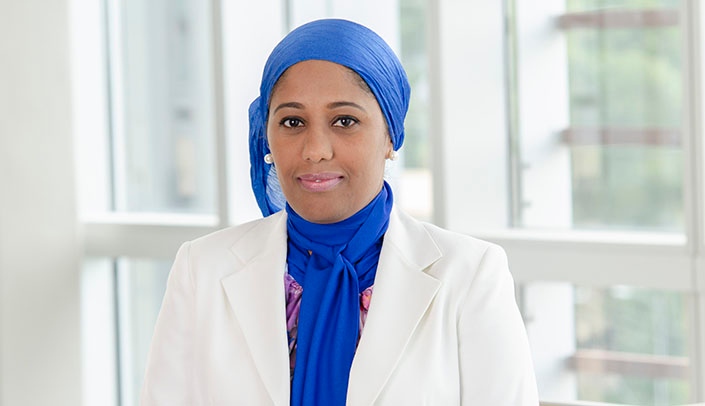A new effort by Sudan University of Science and Technology, in cooperation with Peace Engineering, including faculty from The University of New Mexico School of Engineering, is hoping to improve public health in the nation of Sudan.
And it’s drawing on a model created by UNMC to do so.
In 2021, Nada Fadul, MD, helped create the Community Medical Response Team, a home management program led by medical and health profession students. That model now is being used by Sudan University of Science and Technology and Peace Engineering to address public health issues with the help of student engineers.
While the program is enjoying success — including delivering 20,000 COVID-19 vaccination doses and monitoring 65 patients on home isolation during the first year — Dr. Fadul and her students noticed environmental factors that were impacting health, as well.
“We found there are many other public health infrastructure issues that prevent good health — things related to water, power, telecommunication. All of these issues also relate to health,” Dr. Fadul said.
The new effort draws on UNMC’s template — tele-mentorships through The University of New Mexico’s Project ECHO platform will help deliver timely knowledge from experienced subject-matter experts to Sudan University of Science and Technology students, who will bring that knowledge back to their communities.
When the Sudan University of Science and Technology team recently selected community environment and waste management as its first project through the hub, the Community Medical Response Team was excited to support the effort.
“They were excited about our model, which gives their engineering students a chance to connect to the community. They liked that engagement, and they also knew that the engineering students have a lot to offer to help with these public health infrastructure issues,” Dr. Fadul said.
The Community Engineering Response Team effort has just started, with the first mentorship sessions held in June.
The plan, Dr. Fadul said, is to continue mentorship for six months before the students go out into the community.
“That way, they have a solid project that can be applied to the community,” she said. “They’ll start small, like we did with the medicine project – start with a small community, try to solve the problem, then expand it after it succeeds.”
“Community medical response teams are working in a very systematic way for our community; their teams are everywhere in Sudan,” said Tagwa Musa, associate professor of petroleum engineering and Sudan University of Science and Technology Peace Engineering ECHO hub team leader.
“We were inspired by their model and used it for our Community Engineering Response Team to put efforts into solving the issues of environment and waste management. We believe that community health needs collaboration between CMRT and CERT, and that is what we are currently working on,” she said. “In our current project, we have plans for the two teams to work together on the hospitals waste and study the impact of the produced water on the people health in the oil production areas.”

Congratulations, Dr. Fadul! Amazing work!
Well done Dr. Fadul!
Thank you Dr. Nada. Well done!